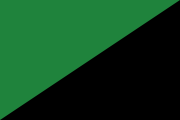
Veganarchism
Encyclopedia

Veganarchism or vegan anarchism, is the political philosophy
Political philosophy
Political philosophy is the study of such topics as liberty, justice, property, rights, law, and the enforcement of a legal code by authority: what they are, why they are needed, what, if anything, makes a government legitimate, what rights and freedoms it should protect and why, what form it...
of veganism
Veganism
Veganism is the practice of eliminating the use of animal products. Ethical vegans reject the commodity status of animals and the use of animal products for any purpose, while dietary vegans or strict vegetarians eliminate them from their diet only...
(more specifically animal liberation
Animal Liberation
Animal liberation may refer to:*Animal rights, animals being considered as legal persons**Animal-liberation movement**Abolitionism , an abolitionist approach to animal rights**Veganarchism, a combined theory of animal liberation and anarchism...
and earth liberation
Earth liberation
Earth liberation has no universal understanding as a concept, as it is much considered to be a part of radical environmentalism, or as a militant off-shoot, favouring instead radical and revolutionary environmentalism.-History:...
) and anarchism
Anarchism
Anarchism is generally defined as the political philosophy which holds the state to be undesirable, unnecessary, and harmful, or alternatively as opposing authority in the conduct of human relations...
, creating a combined praxis that is designed to be a means for social revolution
Social revolution
The term social revolution may have different connotations depending on the speaker.In the Trotskyist movement, the term "social revolution" refers to an upheaval in which existing property relations are smashed...
. This encompasses viewing the state
State (polity)
A state is an organized political community, living under a government. States may be sovereign and may enjoy a monopoly on the legal initiation of force and are not dependent on, or subject to any other power or state. Many states are federated states which participate in a federal union...
as unnecessary and harmful to animals, both human
Human
Humans are the only living species in the Homo genus...
and non-human
Non-human
Non-human is a term used to refer to non-human actors. Its use marks a shift in how the role of humans is perceived and discussed...
, whilst practising a vegan lifestyle. It is either perceived as a combined theory, or that both philosophies are essentially the same. It is further described as an anti-speciesist perspective on green anarchism
Green anarchism
Green anarchism, or ecoanarchism, is a school of thought within anarchism which puts a particular emphasis on environmental issues. An important early influence was the thought of the American anarchist Henry David Thoreau and his book Walden...
, or an anarchist perspective on animal liberation.
Veganarchists typically view oppressive dynamics within society to be interconnected, from statism
Statism
Statism is a term usually describing a political philosophy, whether of the right or the left, that emphasises the role of the state in politics or supports the use of the state to achieve economic, military or social goals...
, racism
Racism
Racism is the belief that inherent different traits in human racial groups justify discrimination. In the modern English language, the term "racism" is used predominantly as a pejorative epithet. It is applied especially to the practice or advocacy of racial discrimination of a pernicious nature...
and sexism
Sexism
Sexism, also known as gender discrimination or sex discrimination, is the application of the belief or attitude that there are characteristics implicit to one's gender that indirectly affect one's abilities in unrelated areas...
to human supremacy and redefine veganism as a radical
Political radicalism
The term political radicalism denotes political principles focused on altering social structures through revolutionary means and changing value systems in fundamental ways...
philosophy that sees the state as harmful to animals. Ideologically, it is a human, animal, and Earth liberation
Earth liberation
Earth liberation has no universal understanding as a concept, as it is much considered to be a part of radical environmentalism, or as a militant off-shoot, favouring instead radical and revolutionary environmentalism.-History:...
movement that is fought as part of the same struggle. Those who believe in veganarchy can be either against reform for animals or for it, although do not limit goals to changes within the law.
The philosophy was first popularised by Brian A. Dominick in Animal Liberation and Social Revolution and later promoted by anarcho-punk
Anarcho-punk
Anarcho-punk is punk rock that promotes anarchism. The term anarcho-punk is sometimes applied exclusively to bands that were part of the original anarcho-punk movement in the United Kingdom in the late 1970s and early 1980s...
band Virus using symbolism
Anarchist symbolism
While anarchists have historically largely denied the importance of symbols to political movement, they have embraced certain symbols for their cause, including most prominently the circle-A and the black flag...
, Roots of Compassion, a zine named 'veganarchy', and political prisoner Jonny Albewhite. The ideology is sometimes referred to as radical veganism, total liberation, total revolution, however not all who believe in the terms perceive them to be veganarchy.
Terms
- Anarchism is a political philosophyPolitical philosophyPolitical philosophy is the study of such topics as liberty, justice, property, rights, law, and the enforcement of a legal code by authority: what they are, why they are needed, what, if anything, makes a government legitimate, what rights and freedoms it should protect and why, what form it...
encompassing theories and attitudesAnarchist schools of thoughtAnarchism is generally defined as the political philosophy which holds the state to be undesirable, unnecessary, and harmful, or alternatively as opposing authority in the conduct of human relations...
which consider the state, as compulsory governmentGovernmentGovernment refers to the legislators, administrators, and arbitrators in the administrative bureaucracy who control a state at a given time, and to the system of government by which they are organized...
, to be unnecessary, harmful, and/or undesirable.
- Veganism is a diet and lifestyle that seeks to exclude the exploitation and cruelty to animalsCruelty to animalsCruelty to animals, also called animal abuse or animal neglect, is the infliction of suffering or harm upon non-human animals, for purposes other than self-defense. More narrowly, it can be harm for specific gain, such as killing animals for food or for their fur, although opinions differ with...
for any purposes, endeavoring not to use or consume animal productAnimal productAnimal product, or animal by-product, is a term used to describe material taken from the body of a non-human animal. Examples are fat, flesh, blood, milk, eggs, and lesser known products such as isinglass and rennet....
s of any kind.
- Veganarchists; those who believe in veganarchism, typically pronounced as v-ganarchism to correctly pronounce veganism, and to distinguish the ideology from veg-anarchism and anarchists.
- Veganarchy is the goal and aim of proponents of the political philosophy of veganarchism.
Origins

The term was popularised in 1995 with Brian A. Dominick's pamphlet Animal Liberation and Social Revolution, described as "a vegan perspective on anarchism or an anarchist perspective on veganism". It was originally published by Critical Mess Media, then in 1997 re-printed by Firestarter Press and re-distributed for anti-copyright
Anti-copyright
Anti-copyright refers to the complete or partial opposition to prevalent copyright laws. Copyright is known as the owner's right for copies to be only made by the owner or with his/her authorization in form of a license....
usage. In 2002 it was translated into Portuguese
Portuguese language
Portuguese is a Romance language that arose in the medieval Kingdom of Galicia, nowadays Galicia and Northern Portugal. The southern part of the Kingdom of Galicia became independent as the County of Portugal in 1095...
by Discórdia edições and into German
German language
German is a West Germanic language, related to and classified alongside English and Dutch. With an estimated 90 – 98 million native speakers, German is one of the world's major languages and is the most widely-spoken first language in the European Union....
by Autonome Tierbefreiungsaktion Hannover in 2005, further circulating the essay abroad. It is currently sold by; AK Press
AK Press
AK Press is a worker-managed independent publisher and book distributor that specialises in radical left and anarchist literature. It is collectively owned and operated.-History:...
, Active Distribution, Re-pressed Distribution and Kids in Misery.
The 18-page pamphlet explains how many young anarchists in the 1990s had been adopting deep ecological
Deep ecology
Deep ecology is a contemporary ecological philosophy that recognizes an inherent worth of all living beings, regardless of their instrumental utility to human needs. The philosophy emphasizes the interdependence of organisms within ecosystems and that of ecosystems with each other within the...
(animal-inclusive and anti-speciesist) mindsets as part of an overall green-anarchist political philosophy. Similarly animal liberationists were becoming increasingly influenced by anarchist thought and traditions, thus becoming veganarchists and adopting an overall praxis.
Brian Dominick described his reasons for the necessity of veganarchism in the opening chapter The Veganarchists:
Oppression
In Animal Liberation and Social Revolution, Brian A. Dominick describes how he believes relationships between oppressive dynamics within the establishment are interconnected, including; classismClassism
Classism is prejudice or discrimination on the basis of social class. It includes individual attitudes and behaviors, systems of policies and practices that are set up to benefit the upper classes at the expense of the lower classes...
, economic oppression
Economic oppression
The term economic oppression, sometimes misunderstood in the sense of economic sanction, embargo or economic boycott, has a different meaning and significance, and its meaning as well as its significance has been changing over a period of time, and its contextual application...
, statism
Statism
Statism is a term usually describing a political philosophy, whether of the right or the left, that emphasises the role of the state in politics or supports the use of the state to achieve economic, military or social goals...
, sexism, homophobia
Homophobia
Homophobia is a term used to refer to a range of negative attitudes and feelings towards lesbian, gay and in some cases bisexual, transgender people and behavior, although these are usually covered under other terms such as biphobia and transphobia. Definitions refer to irrational fear, with the...
, patriarchy
Patriarchy
Patriarchy is a social system in which the role of the male as the primary authority figure is central to social organization, and where fathers hold authority over women, children, and property. It implies the institutions of male rule and privilege, and entails female subordination...
, racism (founded within ethnocentrism
Ethnocentrism
Ethnocentrism is the tendency to believe that one's ethnic or cultural group is centrally important, and that all other groups are measured in relation to one's own. The ethnocentric individual will judge other groups relative to his or her own particular ethnic group or culture, especially with...
), ageism
Ageism
Ageism, also called age discrimination is stereotyping of and discrimination against individuals or groups because of their age. It is a set of beliefs, attitudes, norms, and values used to justify age based prejudice, discrimination, and subordination...
, and the result of human supremacy; speciesism and environmental destruction
Environmental degradation
Environmental degradation is the deterioration of the environment through depletion of resources such as air, water and soil; the destruction of ecosystems and the extinction of wildlife...
. He claims that throughout history the state has been dependent on these interdependent oppressions. It is further understood that the fate of all species are intricately interrelated, so the exploitation
Exploitation
This article discusses the term exploitation in the meaning of using something in an unjust or cruel manner.- As unjust benefit :In political economy, economics, and sociology, exploitation involves a persistent social relationship in which certain persons are being mistreated or unfairly used for...
of animals must play a major role on the impact of the human world. This includes the domestication of animals as being partly responsible for the "emergence of patriarchy, state power, slavery, hierarchy
Hierarchy
A hierarchy is an arrangement of items in which the items are represented as being "above," "below," or "at the same level as" one another...
and domination of all kinds".
Radicalism
On radical veganism, Dominick defines what veganism means, concluding that to not consume the products of non-human animals is not the true meaning of the term, but one of its lifestyle choices; differentiatingDifferentiation (linguistics)
Differentiation in semantics is defined by Löbner as a meaning shift reached by "adding concepts to the original concepts". His example is James Joyce is hard to understand, where understand is differentiated from "perceiving the meaning" to "interpret the text meaning".A related meaning shift is...
it from pure vegetarianism. He criticises self-proclaimed
Self-proclaimed
Self proclaimed or soi-disant is when a legal title is only recognized by the declaring person and not any recognized legal authority. It can be the status of a noble title or the status of a nation...
vegans who justify care free consumption of corporate products, citing poor workers conditions and treatment of human labor, comparing them to non-human suffering. Dominick therefore defines veganism as a radical understanding of what human and non-human animal oppression really is, therefore determining lifestyle choices by an informed and politicized opinion.
Reformism
Dominick describes veganarchists as either opposed to reformist measures for animals (considering them the task of liberals or progressives), such as granting non-humans suffrageSuffrage
Suffrage, political franchise, or simply the franchise, distinct from mere voting rights, is the civil right to vote gained through the democratic process...
, or include but do not limit their goals to changes within the law
Animal rights
Animal rights, also known as animal liberation, is the idea that the most basic interests of non-human animals should be afforded the same consideration as the similar interests of human beings...
. He criticises the need for the state to stand between humans and non-humans, detailing increased crime and violence due to alcohol prohibition and the war on drugs
War on Drugs
The War on Drugs is a campaign of prohibition and foreign military aid and military intervention being undertaken by the United States government, with the assistance of participating countries, intended to both define and reduce the illegal drug trade...
, believing a government orchestrated "War on Meat" would only cause more problems rather than curb animal abuse and the reinforced desires for animal products; preferring instead a non-coercive approach to eliminating animal consumption.
Reformist organisations such as HSUS and PETA
Peta
Peta can refer to:* peta-, an SI prefix denoting a factor of 1015* Peta, Greece, a town in Greece* Peta, the Pāli word for a Preta, or hungry ghost in Buddhism* Peta Wilson, an Australian actress and model* Peta Todd, English glamour model...
have come under heavy criticism from anarcho-vegans, who commonly see them as being connected to welfarism
Welfarism
Welfarism is a form of consequentialism. Like all forms of consequentialism, welfarism is based on the premise that actions, policies, and/or rules should be evaluated on the basis of their consequences. Welfarism is the view that the morally significant consequences are impacts on human welfare...
, compromise and fundraising for animals, therefore moving away from substantive and meaningful goals.
Violence
In Violence in Everyday Life, Brian A. Dominick labels society as being largely based on violence, enhanced by corporate control media images. Dominick depicts power as a social concept and that "those on the receiving end of violence naturally suffer a severe amount of disempowerment", usually asserting what little remaining power they have left. He affirms that victims often internalize oppression, carrying it with them, hence becoming victimizers. Further discussing violence, Dominick regards the abuse of animals - whether directly, as with the mistreatment of pets, or indirectly by eating meat, as correlating to social violence.Direct action

Direct action
Direct action is activity undertaken by individuals, groups, or governments to achieve political, economic, or social goals outside of normal social/political channels. This can include nonviolent and violent activities which target persons, groups, or property deemed offensive to the direct action...
. Organizing themselves through groups like Food Not Bombs
Food Not Bombs
Food Not Bombs is a loose-knit group of independent collectives, serving free vegan and vegetarian food to others. Food Not Bombs' ideology is that myriad corporate and government priorities are skewed to allow hunger to persist in the midst of abundance...
, Stop Huntingdon Animal Cruelty (SHAC), the Animal Liberation Front (ALF)
Animal Liberation Front
The Animal Liberation Front is an international, underground leaderless resistance that engages in illegal direct action in pursuit of animal liberation...
and Earth Liberation Front (ELF), in autonomous, covert cells, they may take action against the meat and dairy industries, animal testing
Animal testing
Animal testing, also known as animal experimentation, animal research, and in vivo testing, is the use of non-human animals in experiments. Worldwide it is estimated that the number of vertebrate animals—from zebrafish to non-human primates—ranges from the tens of millions to more than 100 million...
laboratories, fur farms, logging industries and, more rarely, government institutions.
Such actions are normally, though not always, non-violent. Though not necessarily veganarchists, activists have used the names Animal Rights Militia
Animal Rights Militia
The Animal Rights Militia is a banner used by animal rights activists who engage in direct action that ignores the Animal Liberation Front's policy of taking all necessary precautions to avoid harm to human and non-human life.-History:...
(ARM), Revolutionary Cells – Animal Liberation Brigade (RCALB), Justice Department, and others to claim responsibility for politically motivated violent attacks
Terrorism
Terrorism is the systematic use of terror, especially as a means of coercion. In the international community, however, terrorism has no universally agreed, legally binding, criminal law definition...
.

